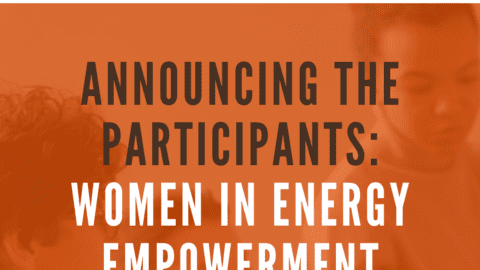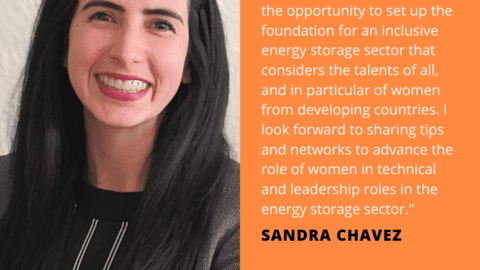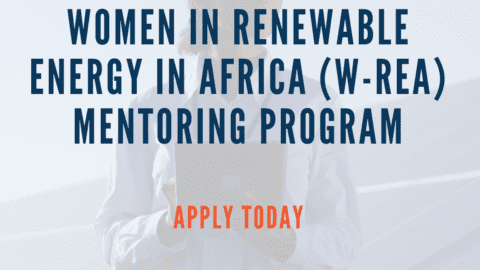The Women in Energy Empowerment Mentoring Programme sat down with Shuyi Li, one of this year’s mentors, to chat about her journey in renewable energy and the challenges and opportunities in the sector. Shuyi is a Manager at RMI in China.
1) Tell us a little about yourself. What do you love most about what you do?
I am a Manager of RMI (previously known as Rocky Mountain Institute), an independent, nonpartisan nonprofit founded in 1982 with the mission of transforming the global energy system to secure a clean, prosperous, zero-carbon future for all. I am with RMI’s China program, where I lead the work to support decarbonizing China’s heavy industry. My work is to support industry players on energy transition strategies and continue to drive solid implementation.
The thing I love the most about what I do is seeing how my efforts translate into real impacts to make our world better. One important part of my work is to perform in-depth analysis on zero-carbon energy transition roadmaps for China’s largest carbon emitters including steel, cement, petrochemicals and chemicals sectors.
Decarbonizing these sectors is challenging, but it is nice and rewarding to see how the work helps to direct the way forward. I am so proud to contribute some efforts to facilitate joint actions towards China’s 2060 carbon neutrality goal, and the energy transition globally.
2) What were your goals when you started working in the energy sector? What are your goals today?
The moment I became dedicated to working in the energy sector dates back to 2016 when I participated in EDF Climate Corps’ program to help green IKEA’s supply chain by recommending alternative types of energy as a way to reduce the suppliers’ reliance on coal over mainland China. That was when I realized we actually can achieve better performance in production and cost, while at the same time reducing negative effects to the climate and environment. The key to it is to be smart enough in transforming the way we use energy.
So that brought me to the goal of leveraging what I learned to support a clean and prosperous energy transition. And that goal still keeps on today. Adding to that, as the transition needs to happen more quickly, I hope to empower more professionals to join efforts.
3) What are the opportunities for sustainable energy in your country?
China can be the powerhouse to drive the world’s sustainable energy transition, given its important role in the global value chain, and its good position to mature new technologies. Currently, 2 of the top 5 wind turbine manufacturers and 8 of the world’s largest solar panel manufacturers are in China.
And China has been the hotbed to realize economies of scale. This not only contributes to a more cost-effective way of how clean energy is produced but also benefits the demand side to deploy decarbonized routes at a large scale. Above that, the 2060 carbon neutrality goal gives the strongest momentum ever to push a sustainable energy transition forward. This policy signal enables a supportive environment to grow clean energy and helps to cultivate the overall value chain.
The zero-carbon energy transition is a battlefield where winning slowly is the same as losing. While stakeholders might have a strong willingness to drive the process, given the complexity to deal with potential risks and uncertainties, they might still need clear guidance and enough know-how to set practical action plans.
Another challenge lies in the still high green premium in the short run to apply carbon reduction or decarbonization solutions, like mass electrification, green hydrogen, carbon capture and storage, utilization of bioenergy, etc. In this regard, we should not only focus on each sector itself but also all stakeholders along the value chain for joint efforts, starting with pilots and then exploring effective mechanisms to scale up.
I am more than honoured and humbled to be selected as a mentor in this wonderful Women in Energy Empowerment programme. I hope to grow with my mentee in turn as I provide support as much as I can. I am happy to share advice on career development paths, help extend her network within the sector, and moreover, learn from each other’s experience from day-to-day work to milestones. I am so excited to be part of the journey.
6) What advice would you give to women hoping to join the sustainable energy sector?
Women play an equally important role as men in the energy sector. I have seen a lot of talented women in the field of energy transition already, and do hope more women professionals can join in this great career. Platforms like the Women in Energy Empowerment programme have brought together very good resources. We definitely can do great things together.
Become a Mentor – What’s in it for You?
As a mentor, you get the opportunity to give something valuable back to more junior professionals and to expand your own knowledge through the mentees’ perspective.
Mentoring will contribute to personal and professional development for both you and your mentee, as well as, shaping the direction of future generations within your field of expertise. If you are interested in volunteering as a mentor in one of GWNET’s mentoring programmes (which involves approx. 1 – 1.5 hours of engagement per month plus optional participation in knowledge-transfer webinars), kindly fill in our Mentor Datasheet.
Stay tuned for updates on the participants and the programme.
Read more about GWNET’s mentoring programmes here.











